The best MPVs and people carriers – driven and tested
The best way to haul people and cargo is still with an MPV. These are the best ones currently on sale

News
by Jack Warrick
8 mins read
28 April 2025
Share
Multi-purpose vehicles (MPVs) are among the most versatile forms of transport you can find, majoring on space, practicality and people-carrying.
One of their biggest selling points is their extremely efficient use of space, which means they’re often better value than vehicles with a similar footprint.
But don’t think MPVs are lacking in other areas: they’re packed with clever and handy features that reduce the stress of transporting families, often to better effect than some of the best SUVs.
Related articles
- The best seven-seat cars: driven and ranked
- New-look 2025 Dacia Jogger set for hybrid power boost
- Dacia Jogger review
- Autocar Awards 2023: spacious Dacia Jogger wins Best Family Car
- Dacia reshuffles production planning for new Bigster SUV
Generally speaking, MPVs feature up to seven seats, but the sector also includes five-seat models. Some even go up to nine seats.
With SUVs continuing to surge ahead in the sales charts, though, the number of MPVs on sale in the UK has dropped. We’ve lost the Ford S-Max, Ford Galaxy and Volkswagen Sharan in the past few years, for example. But the MPV hasn’t slipped into obscurity just yet.
Our top MPV pick is the Dacia Jogger, which offers by far the best value for money and supreme practicality. But which other models should you consider buying? Read on to find out about the top 10 MPVs and people carriers…
1. Dacia Jogger
9
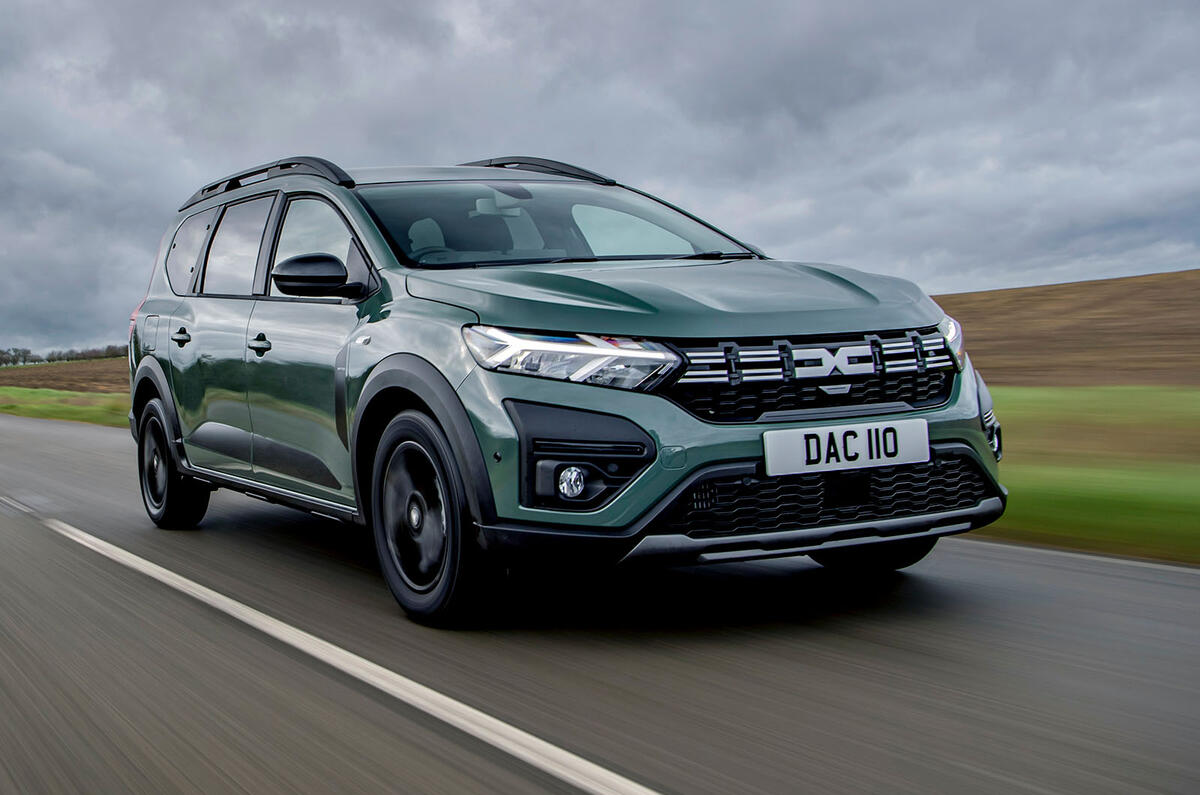
- Design8
- Interior8
- Performance7
- Ride & Handling8
- Costs9
Pros
Outstandingly good value
Versatile and practical for its size
Surprisingly agile at lower speeds
Cons
Powertrain has its rougher, lazier moments
Limited engine range
Interior can feel cheap
Best for: Value for money
Amid a flood of more premium options that have supreme badge appeal, the Dacia Jogger stands at the top of the pile as the best MPV on sale today.
At just over 4.5 metres in length, the Jogger is a little shorter at the kerb than a typical C-segment MPV, but that doesn’t prevent it from offering usable passenger accommodation for up to seven.
The Jogger is a genuine seven-seat family car that you can buy new for less than £15,000. But there’s so much more to this versatile machine than its bargain-basement price.
It offers five decent-sized seats and a couple of more kiddy-sized ones in the boot, but the latter can easily be lifted out entirely when you’ve got big loads to carry.
Dacia’s MPV is arguably all the car your family would ever need. It can be had with hybrid power too if you want to save even more cash on running costs.
Performance, ride and handling are all as capable as you would expect, although you will encounter comical levels of body roll if you push too hard.
Regardless, there hasn’t been a new MPV with the potential to rejuvenate interest in this class for a decade or more, but the Jogger’s value alone could do that.
Read our Dacia Jogger review
Save money with new Dacia Jogger deals from What Car?
Finance this car with Drivenfi
Latest Reviews

Citroen e-C3
7

Mercedes-Benz E-Class
8

Skoda Fabia
9

Audi A3 Sportback
7

Mercedes-Benz EQS
8
Read our review
Car review

Dacia Jogger
MPV and SUV tropes fuse with a compact seven-seater of likeably humble aspect
Back to top
2. Citroën Berlingo
8
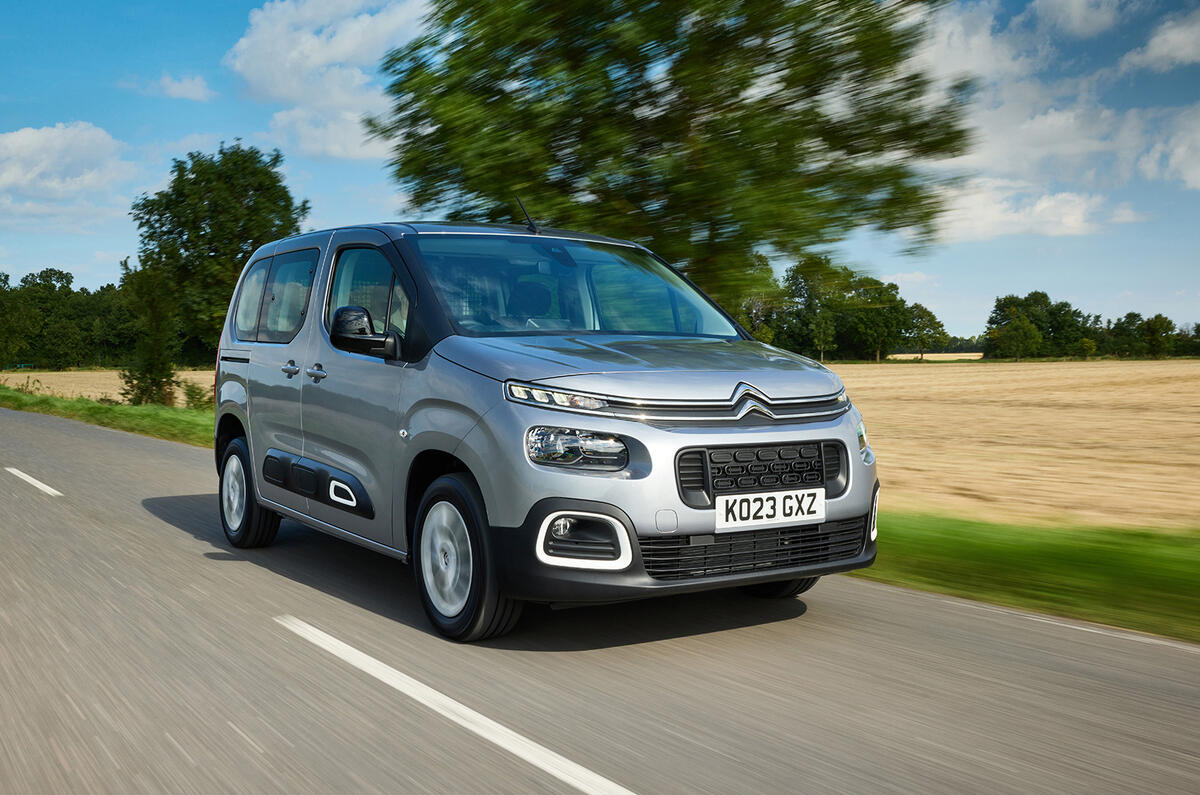
- Design8
- Interior8
- Performance7
- Ride & Handling7
- Costs8
Pros
Massive boot and lots of storage
Comfortable to drive
Sliding doors
Cons
Not as sharp as many large SUVs
Cheap-feeling interior
Short electric range
Best for: Interior space
More than two decades and almost two million sales ago, Citroën pioneered the van-based MPV with the Berlingo, and this latest (third-generation) model returns to the original’s charm and oddball likeability.
A vast interior, which is used intelligently with an array of storage spaces and solutions, sliding rear doors that improve access in tight confines and robust furnishings make this a fine choice.
What’s more, its appeal has recently been enhanced by Citroën’s reversal of its decision to drop petrol and diesel versions.
Both the 1.2-litre petrol and 1.5-diesel have been reinstated, albeit only in the five-seat bodystyle. If you need the seven seats provided by the longer XL version, you’re restricted to the 134bhp electric powertrain with its 50kWh battery, which provides a realistic range of around 110 miles.
Whatever the motive force, there are stout reasons to buy a Berlingo instead of a more conventional MPV. The interior is truly cavernous, with 186 litres of storage space dotted about it. The sliding doors are also a great feature.
Best of all, the Berlingo rides with a languid calmness and steers intuitively, making it a relaxing companion regardless of the quality or type of road.
Read our Citroën Berlingo review
Save money with new Citroën Berlingo deals from What Car?
Finance this car with Drivenfi
3. Volkswagen Multivan
8
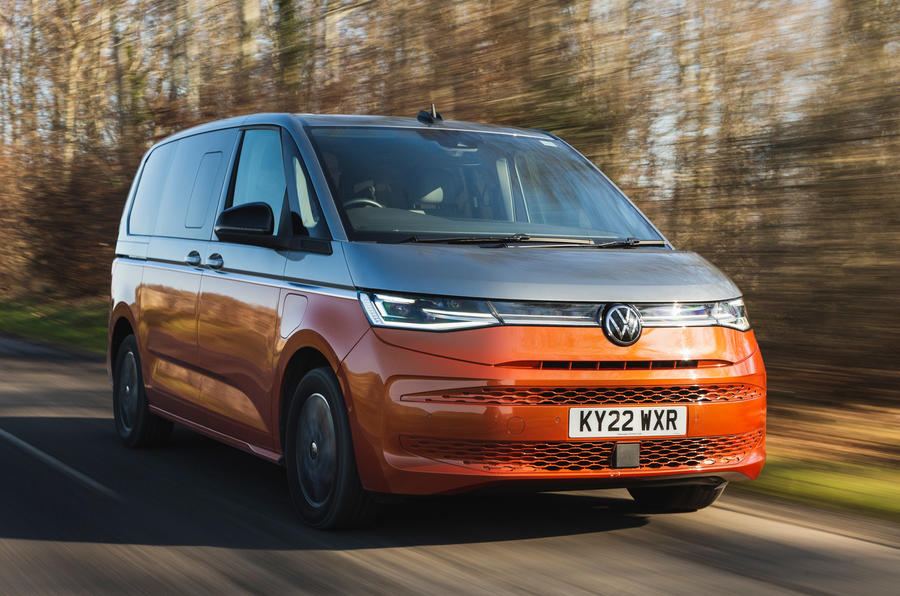
- Design8
- Interior9
- Performance8
- Ride & Handling7
- Costs7
Pros
Versatile interior
Great look and feel inside
Very easy to place, given its size
Cons
Fiddly infotainment system
Some rattles and resonances
Defaults to electric mode on every start
Best for: Interior versatility
Here’s another van-based MPV, but this is a full-sized one that’s perfect for the largest of families.
For vans, it’s usually what’s inside that counts, but the T7’s car-derived platform and electrified powertrain make it surprisingly composed and comfortable on the move.
The Transporter-based Multivan is arguably the most stylish and car-like version to appear in ‘T’ history, which can trace its roots back nearly 80 years.
Underpinned by the brand’s MQB car platform rather than a commercial vehicle platform, the T7 drives with all the assurance, comfort and refinement of a very large Golf. The steering is accurate, body control is good and the ride is pliant.
This is backed up by a punchy engine line-up that runs to a 1.5-litre petrol and 2.0-litre diesel, plus the 2.0-litre TSI petrol from the Golf GTI. There’s also a plug-in hybrid, complete with a claimed EV range of 31 miles, and sliding doors.
Inside, the Multivan is simply vast and offers the sort of flexibility that other MPVs can only dream of. There are seven individual seats (you can have fewer if you wish) and the ones in the back slide, swivel and fold.
Remove the chairs (at 15kg apiece, they ain’t light) and you can run a removal service at the weekend.
The Multivan is a spacious, comfortable and brilliantly sorted people carrier. But with prices starting at just over £40,000 and rising to within an uncomfortable biscuit of £70,000, so it should be.
Read our Volkswagen Multivan review
Save money with new Volkswagen Multivan deals from What Car?
Finance this car with Drivenfi
Back to top
4. Volkswagen ID Buzz
8
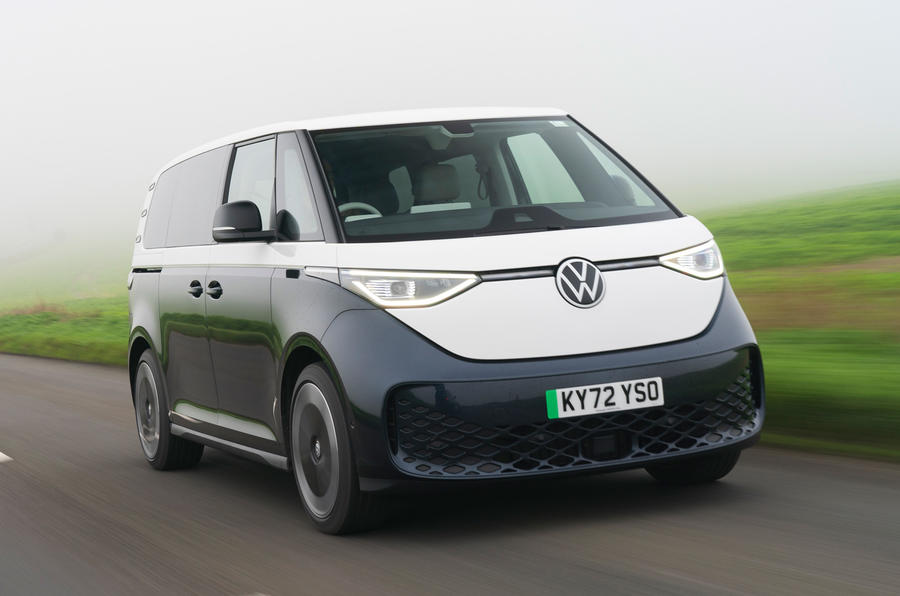
- Design9
- Interior8
- Performance8
- Ride & Handling8
- Costs7
Pros
Comfort and passenger space
Refinement and touring manners
Just enough Type 2 charms
Cons
High price
Lacks clever cabin modularity
It could certainly be smaller
Best for: Character
The Volkswagen ID Buzz was one of the industry’s most hotly anticipated vehicles before it arrived.
The ID Buzz is a surprisingly wieldy, manoeuvrable and composed drive when nipping around urban environments, and it maintains respectable body control out of town.
It sits on the Volkswagen Group’s MEB platform, which means this big bus shares the same underpinnings as the ID 3, ID 4 and ID 5. Similarly to the Multivan, the ID Buzz is more of a car than an actual van.
In fact, the ID Buzz has been available since launch as a five-seat passenger car and as a 2+1 Cargo commercial vehicle variant.
A seven-seat, long-wheelbase version with a larger, 110kWh battery has been available since mid-2024 too, improving its versatility further.
The regular-wheelbase models have a 77kWh battery for an official range of 255 miles – not the highest figure in the world, but a maximum charging speed of 170kW makes top-ups quick.
Entry-level models are driven by a single 201bhp electric motor, but a sporty GTX variant adds a second motor for four-wheel drive and a combined 335bhp.
Whether you’re a devotee of Volkswagen’s traditional camper van or after a conventional people carrier, the ID Buzz offers a likeable package of versatility-first electric family motoring.
Read our Volkswagen ID Buzz review
Save money with new Volkswagen ID Buzz deals from What Car?
Finance this car with Drivenfi
5. Ford Grand Tourneo Connect
8
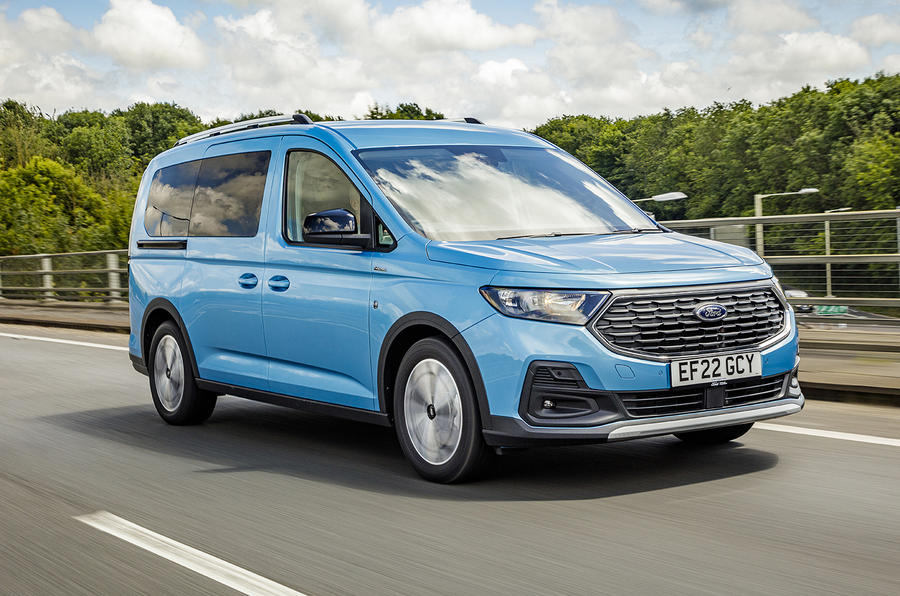
- Design8
- Interior8
- Performance8
- Ride & Handling8
- Costs8
Pros
Airy and spacious interior
Seats can be removed for van-like cargo space
Cheaper than many options on this list
Cons
Poor infotainment
Ride is prone to thumping
Ineffective touchpad climate control
Best for: Handling
The latest Tourneo Custom picks up where its underrated predecessor left off. That car delivered Berlingo-style space and utility with genuine dynamic polish, and the latest version is no different.
The Tourneo is now based on the Volkswagen Group’s much-used MQB car platform, whereas previously it was derived from the ubiquitous Transit van, and it certainly feels more car-like to drive than I had been expecting.
Based on Volkswagen’s MQB platform, the Tourneo Connect has been tuned by Ford’s engineers to give it a poised and plush feel that allows it to scythe through corners as effortlessly as it soaks up bumps.
As before, there’s a choice of two bodystyles: a standard five-seater and a longer (Grand Tourneo) seven-seat option. Both deliver acres of interior space and loads of handy storage, while the sliding rear side doors boost an already versatile package.
Go for the seven-seat version and, with both rear benches removed, there’s a cavernous 3100 litres of carrying capacity.
And if you would rather have a VW badge on the nose, there’s the Caddy.




